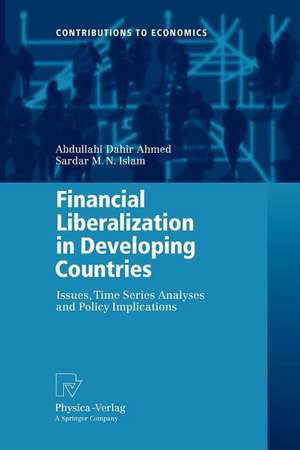Financial Liberalization in Developing Countries: Issues, Time Series Analyses and Policy Implications: Contributions to Economics
Autor Abdullahi Dahir Ahmed, Sardar M. N. Islamen Limba Engleză Paperback – 14 mar 2012
| Toate formatele și edițiile | Preț | Express |
|---|---|---|
| Paperback (1) | 945.47 lei 6-8 săpt. | |
| Physica-Verlag HD – 14 mar 2012 | 945.47 lei 6-8 săpt. | |
| Hardback (1) | 951.47 lei 6-8 săpt. | |
| Physica-Verlag HD – 15 oct 2009 | 951.47 lei 6-8 săpt. |
Din seria Contributions to Economics
- 18%
 Preț: 1001.81 lei
Preț: 1001.81 lei -
 Preț: 90.83 lei
Preț: 90.83 lei - 15%
 Preț: 649.06 lei
Preț: 649.06 lei - 18%
 Preț: 1109.92 lei
Preț: 1109.92 lei - 24%
 Preț: 657.09 lei
Preț: 657.09 lei - 18%
 Preț: 976.54 lei
Preț: 976.54 lei - 17%
 Preț: 361.03 lei
Preț: 361.03 lei - 18%
 Preț: 1027.83 lei
Preț: 1027.83 lei -
 Preț: 283.93 lei
Preț: 283.93 lei - 15%
 Preț: 644.95 lei
Preț: 644.95 lei - 15%
 Preț: 638.24 lei
Preț: 638.24 lei -
 Preț: 394.29 lei
Preț: 394.29 lei - 15%
 Preț: 636.80 lei
Preț: 636.80 lei - 15%
 Preț: 637.78 lei
Preț: 637.78 lei - 18%
 Preț: 723.69 lei
Preț: 723.69 lei - 15%
 Preț: 635.47 lei
Preț: 635.47 lei - 15%
 Preț: 634.00 lei
Preț: 634.00 lei -
 Preț: 392.75 lei
Preț: 392.75 lei -
 Preț: 383.33 lei
Preț: 383.33 lei - 15%
 Preț: 637.28 lei
Preț: 637.28 lei - 15%
 Preț: 636.80 lei
Preț: 636.80 lei - 18%
 Preț: 950.96 lei
Preț: 950.96 lei - 15%
 Preț: 634.68 lei
Preț: 634.68 lei -
 Preț: 387.38 lei
Preț: 387.38 lei - 15%
 Preț: 647.27 lei
Preț: 647.27 lei - 15%
 Preț: 636.63 lei
Preț: 636.63 lei - 15%
 Preț: 639.73 lei
Preț: 639.73 lei -
 Preț: 385.62 lei
Preț: 385.62 lei - 15%
 Preț: 641.85 lei
Preț: 641.85 lei - 20%
 Preț: 649.60 lei
Preț: 649.60 lei - 15%
 Preț: 641.71 lei
Preț: 641.71 lei -
 Preț: 387.96 lei
Preț: 387.96 lei - 15%
 Preț: 645.47 lei
Preț: 645.47 lei -
 Preț: 385.08 lei
Preț: 385.08 lei - 15%
 Preț: 646.62 lei
Preț: 646.62 lei -
 Preț: 383.33 lei
Preț: 383.33 lei - 15%
 Preț: 638.43 lei
Preț: 638.43 lei -
 Preț: 381.21 lei
Preț: 381.21 lei - 15%
 Preț: 642.51 lei
Preț: 642.51 lei - 15%
 Preț: 637.78 lei
Preț: 637.78 lei - 15%
 Preț: 641.71 lei
Preț: 641.71 lei -
 Preț: 384.70 lei
Preț: 384.70 lei -
 Preț: 379.86 lei
Preț: 379.86 lei -
 Preț: 378.34 lei
Preț: 378.34 lei -
 Preț: 384.70 lei
Preț: 384.70 lei -
 Preț: 388.52 lei
Preț: 388.52 lei - 15%
 Preț: 641.71 lei
Preț: 641.71 lei -
 Preț: 381.00 lei
Preț: 381.00 lei - 15%
 Preț: 644.95 lei
Preț: 644.95 lei -
 Preț: 386.00 lei
Preț: 386.00 lei
Preț: 945.47 lei
Preț vechi: 1153.02 lei
-18% Nou
Puncte Express: 1418
Preț estimativ în valută:
180.97€ • 196.64$ • 152.12£
180.97€ • 196.64$ • 152.12£
Carte tipărită la comandă
Livrare economică 21 aprilie-05 mai
Preluare comenzi: 021 569.72.76
Specificații
ISBN-13: 9783790828078
ISBN-10: 3790828076
Pagini: 316
Ilustrații: XVIII, 298 p. 42 illus., 20 illus. in color.
Dimensiuni: 155 x 235 x 17 mm
Greutate: 0.45 kg
Ediția:2009
Editura: Physica-Verlag HD
Colecția Physica
Seria Contributions to Economics
Locul publicării:Heidelberg, Germany
ISBN-10: 3790828076
Pagini: 316
Ilustrații: XVIII, 298 p. 42 illus., 20 illus. in color.
Dimensiuni: 155 x 235 x 17 mm
Greutate: 0.45 kg
Ediția:2009
Editura: Physica-Verlag HD
Colecția Physica
Seria Contributions to Economics
Locul publicării:Heidelberg, Germany
Public țintă
ResearchCuprins
Background, Structure and Financial Reforms.- Literature Review.- The Theory of Financial Liberalization and its Economic Impact: An Assessment.- An Analysis of the Economic Outcome of Financial Liberalization.- Testing the Potential Impact of Economic Changes on Savings in African Countries.- Welfare Implications of Financial Liberalization in Thailand: A Cost-Benefit Analysis.- Summary, Findings and Conclusion.
Textul de pe ultima copertă
The latest global financial and economic crisis of 2008 has shown the need to re-examine the desirability of financial liberalization. This book is undertaking such a study on the issue of financial and market liberalization by adopting sophisticated econometric methods. It examines the effects of financial liberalization on economic development and social welfare using a case study approach on a sample of three Sub-Saharan African and an Asian country in which financial liberalization reforms were implemented. Further, it highlights some key causes of the failure of reform, and the policies and institutions that are needed to create an environment for successful financial liberalization. From the detailed country assessments, various policies such as effective competition in the banking sector, sound legal system, fiscal discipline and financial institutional development are identified, adoption of which can improve the efficiency of resource allocation, boost savings and impact growth, and thus lead to welfare enhancement.
Caracteristici
Includes supplementary material: sn.pub/extras














